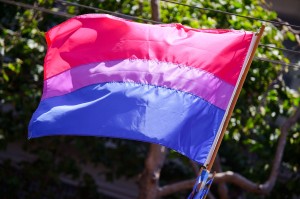not just a phase: outrage at speculation over cara delevingne’s sexuality

Luminary fashion magazine Vogue has recently been on the receiving end of an outbreak of criticisms regarding their July cover story on model-come-actress Cara Delevingne, for labelling her sexual orientation as a ‘phase’. The interview between Delevingne and Vogue reporter Rob Haskell touched on the subject of Delevingne’s romantic relationships with both men and women, most recently singer Annie Clark (more commonly known by her stage name, St. Vincent).
Delevingne’s comments about her relationships are refreshingly frank and unguarded, depicting sexuality as the composite and fluid construct that it is. Rather than applaud such honesty and sincerity from the 22 year old supermodel, Haskell denigrates her sexual orientation: ‘Her parents seem to think girls are just a phase for Cara, and they may be correct.’
Similar views on bisexuality are not uncommon, with those identifying as bisexual being constantly told that their sexual identity is nothing more than an experimentation or excuse for promiscuity. According to a study conducted in 2008 by Utah psychologist Lisa Diamond in the January issue of the journal Developmental Psychology, ‘Bisexuality in women could be a lifelong sexual orientation, not a phase’. The finding runs against the notion that bisexuality is a transitional period for women. Although this study was conducted with only women-identifying subjects, it does not rule out the inference that this is just as applicable to male bisexuality. Along with discrediting sexual stereotypes, the research sheds light on the complex nature of sexual orientation in women. ‘These findings demonstrate that the distinction between lesbianism and bisexuality is a matter of degree rather than kind.’ Diamond writes.
Haskell’s unenlightened views on Delevingne’s orientation did not stop at delegitimising her personal relationships, instead going on to suggest that any non-heteronormative expression of sexuality is the product of a broken childhood: ‘When I suggest to Cara that to trust a man, she might have to revise an old and stubborn idea of hers – that women are perennially troubled and therefore only women will accept her – her smile says she concedes the point.’ Haskell oversteps so many boundaries through patriarchal and chauvinistic thought processes the mind boggles. By assuming that Delevingne ‘conceded’ his point through her ‘smile’, Haskell essentially fabricates consent for his remark where there was none before, propagating the idea that that this attractive young lady, in her capacity as a supermodel, need only look pretty and smile to fulfill her obligations as a woman, instead of voice her real opinions.
Bisexuality does not receive nearly as much media attention as other sexual identities, leading to, paradoxically, either a fate of fetishisation or skepticism. While there are certainly more LGBTQIA* characters in shows and movies than during the 1990s and early 2000s, it’s a far cry from accurately representing the entire community. Anyone familiar with its politics also knows that the racial, sexual and gender diversity of the queer community isn’t remotely well represented.
Indeed, according to GLAAD’s (the Gay and Lesbian Alliance Against Defamation) latest media reports on television, out of the ‘66 regular or recurring LGBT characters on scripted cable television, 35 are gay men, while only four are bisexual males’.
Bisexual men and women do not need the Vogues of the world doing more to marginalise and delegitimise their identities. Attraction and sexuality are complicated and messy things, and it is imperative that people who write about these subjects be conscientious of the communities they are covering. So here’s some free advice for Haskell and anyone else writing words about a community that they are not a part of: before you dismiss an entire sexual identity as a ‘phase’, pause for a minute, reflect on your own ignorance, look down at your keyboard, and hit the delete button. Until this simple instruction is recognised more globally, we will continue to assert ‘it’s just a phase’ is just a phrase.
*Lesbian, Gay, Bisexual, Transgender, Queer, Intersex, Asexual

